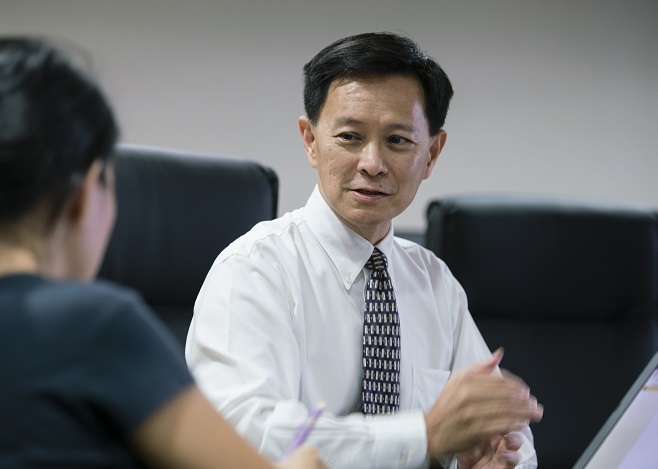Don’t live out your dreams through your children – that’s what Dr Lim Suet Wun wants to tell all parents. The veteran healthcare administrator shares personal tales about his life as a doctor, a parent and a boss who believes in learning to love what you do, more than doing what you love.
1. What are some misconceptions people often have of the healthcare industry?
First, the healthcare industry is very broad. It’s not just about being a doctor. There are the pharmaceutical, manufacturing, insurance, training, educational and research components. Even within the medical profession, there are medicine, nursing and allied health. Allied health includes physiotherapy, occupational therapy, speech therapy.
Second, being in healthcare doesn’t guarantee an “iron rice bowl”. Some may think that Singapore’s ageing population means an ever-rising demand for medical services. But life is cyclical. Demand may grow in the next 20-30 years, but after that, as whole generations live and die, the population would have shrunk and we may not necessarily need as many healthcare workers.
2. You wanted to be a surgeon but are now known as a top-notch medical administrator. Why the switch?
When I was training to be a doctor, I developed an eye problem. I had corneal grafts in both eyes and couldn’t do surgery as a result. Fortunately, young doctors were encouraged then to go into management. I saw it as an attractive, “un-beaten” path.
3. Was the switch difficult? How did you ease into a management role?
In every job, there are parts you love, and parts you detest. I would say that in the end, learning to love what you do, is more important than doing what you love.
When I made the switch, I had to read a lot of medical journals to find out about different healthcare systems around the world. Another part of my job that I found challenging was that I am required to speak in public. As an introvert, I hate public speaking. I get butterflies in my tummy and break into a cold sweat; my heart rate goes up. I don’t like it, but I had to do it. So I developed coping mechanisms. I studied what works for me and practised repeatedly. Now people tell me I’m a charismatic speaker. Well, it was the result of a lot of hard work.
4. Should parents encourage their children to “follow their passion”?
Parents should never blindly encourage their children to blindly “follow their passion”. Take the reality singing TV series, American Idol, for instance. Many people are passionate about singing, but not all of them sing well.
Children, with the support of their parents, should decide what they want in their lives based on what they are talented in, and have situational awareness – hindsight, insight then foresight. Do what you are good in and if it turns out later you’re not good in it, adapt.
My wife, for instance, could never have been a great pianist because she has small hands, but her parents pushed her to try for a piano diploma; she failed thrice and never obtained it.
Of course, passion and talent can dovetail. Likewise, for some, their ability may match their ambition. But this probably doesn’t apply to most of us.
5. What can parents do to help children with career choices?
It’s not easy because parents are emotionally invested in our children, but my advice would be – don’t try to live vicariously, and don’t do too much. We may end up interfering, and we certainly cannot define the future for our children. It’s probably unwise for parents to tell their children “go and be a doctor” if they are giving advice about something they are unsure of.
When it comes to career guidance, parents need to be a little bit like job counsellors, and be slightly detached. If the child says he wants to be a doctor, ask: “Do you really want to be a doctor? Why?” You ask, rather than tell.
6. If healthcare is a possible profession for my child, what skills are required?
Healthcare, in a sense, is a calling. Those who want to go into it must find pleasure in helping others; if they do they will enjoy emotional satisfaction.
But in general, the challenge in this industry, as in all other industries, is that the world will remain highly competitive. In medicine, change in technology happens so quickly, the skills you learn in school probably won’t see you through your lifetime. People will have to work hard, work smart, continually learn, develop and adapt. Experience is not as valuable as it was in the past because the knowledge base is shifting so quickly.






